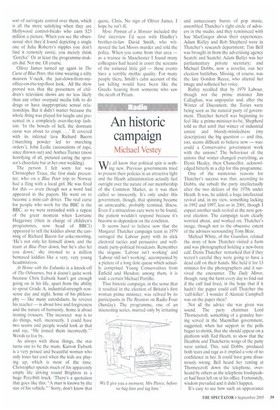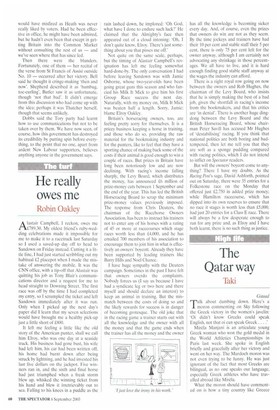An historic campaign
Michael Vestey
Weall know that political spin is nothing new. Previous governments tried to present their policies in an attractive light and the Heath administration actually lied outright over the nature of our membership of the Common Market, as it was then called so innocently. It's only under this government, though, that spinning became an untreatable, probably terminal, illness. Even if a miraculous cure were to be found, the patient wouldn't respond because it's become so dependent on the condition.
It seems hard to believe now that the Margaret Thatcher campaign team in 1979 outraged the Labour party with its slick electoral tactics and persuasive and wellmade party-political broadcasts. Remember the slogans: 'Labour isn't working' and 'Labour still isn't working', accompanied by a picture of a long dole queue which actually comprised Young Conservatives from Enfield and Hendon; among them, it is said, a certain Michael Portillo.
That historic campaign, in the sense that it resulted in the election of Britain's first woman prime minister, was relived by its participants in The Reunion on Radio Four (Sunday). The programme, one of an interesting series, marred only by irritating and unnecessary bursts of pop music, assembled Thatcher's tight circle of advisers in the studio, and they reminisced with Sue MacGregor about their experiences. Adam Ridley and Rob Shepherd were in Thatcher's research department; Tim Bell was brought in from the advertising agency Saatchi and Saatchi; Adam Butler was her parliamentary private secretary; and Michael Dobbs, now a novelist, ran her election battlebus. Missing, of course, was the late Gordon Reece, who altered her image and softened her voice.
Ridley recalled that by 1979 Labour, though not the prime minister Jim Callaghan, was unpopular and, after the Winter of Discontent, the Tories were being seen as the natural party of government. Thatcher herself was beginning to feel like a prime-minister-to-be. Shepherd told us that until that winter of industrial unrest and bloody-mindedness (my description) the big question — and this, too, seems difficult to believe now — was: could a Conservative government work with the unions? The behaviour of the unions that winter changed everything, as Denis Healey, then Chancellor, acknowledged bitterly in a clip for this programme.
One of the numerous reasons for Thatcher's success was that, according to Dobbs, she rebuilt the party intellectually after the two defeats of the 1970s under Heath. It was, he added, a huge intellectual revival and, in my view, something lacking in 1992 and 1997, less so in 2001, though I expect another such revival at the next general election. The campaign team clearly worried about, and worked on, Thatcher's image, though not to the obsessive extent of the advisers surrounding Tony Blair.
Michael White, of the Guardian, related the story of how Thatcher visited a farm and was photographed holding a new-born calf. Denis Thatcher remarked that if they weren't careful they were going to have a dead calf on their hands. She held it for 13 minutes for the photographers and it survived the encounter. The Daily Mirror, though, rang the farm every day to find out if the calf had lived, in the hope that if it hadn't the paper could call Thatcher the `calf-killer'. I wonder if Alastair Campbell was on the paper then?
Not all the advice she was given was sound. The party chairman Lord Thorneycroft, something of a grandee having served in the Macmillan government, suggested, when her support in the polls began to shrink, that she should appear on a platform with Ted Heath, to show that the Heathite and Thatcherite wings of the party were united. This, said Dobbs, produced both tears and rage as it implied a vote of no confidence in her. It could have gone disastrously wrong. Bell heard her ranting at Thorneycroft down the telephone, overheard by others as the telephone loudspeaker had been left on at his office. Fortunately, wisdom prevailed and it didn't happen.
It's easy to see how such an appearance would have misfired as Heath was never really liked by voters. Had he been effective in office, he might have been admired, hut he hadn't even been that except in getting Britain into the Common Market without consulting the rest of us — and we've seen where that has since led.
Then there were the blunders. Fortunately, one of them — her recital of the verse from St Francis of Assisi outside No. 10 — occurred after her victory. Bell said he thought it cringe-making 'then and now'. Shepherd described it as 'humbug, toe-curling', Butler saw it as unfortunate, though not that bad', It didn't emerge from this discussion who had come up with the idea: perhaps it was Thatcher herself, though that seems unlikely.
Dobbs said the Tory party had learnt how to use communications but not to be taken over by them. We have now seen, of course, how this government has destroyed its credibility by putting spin before everything, to the point that no one, apart from ardent New Labour supporters, believes anything anyone in the government says.











































































 Previous page
Previous page